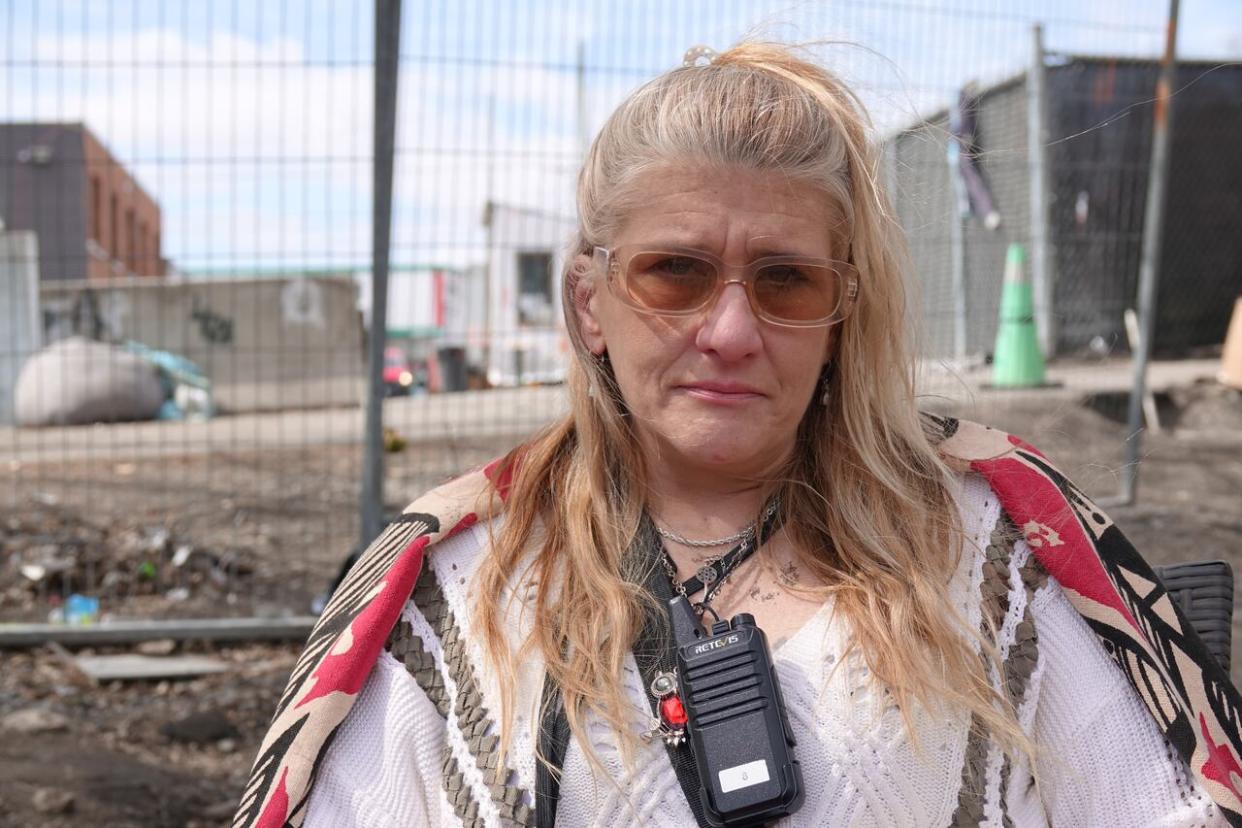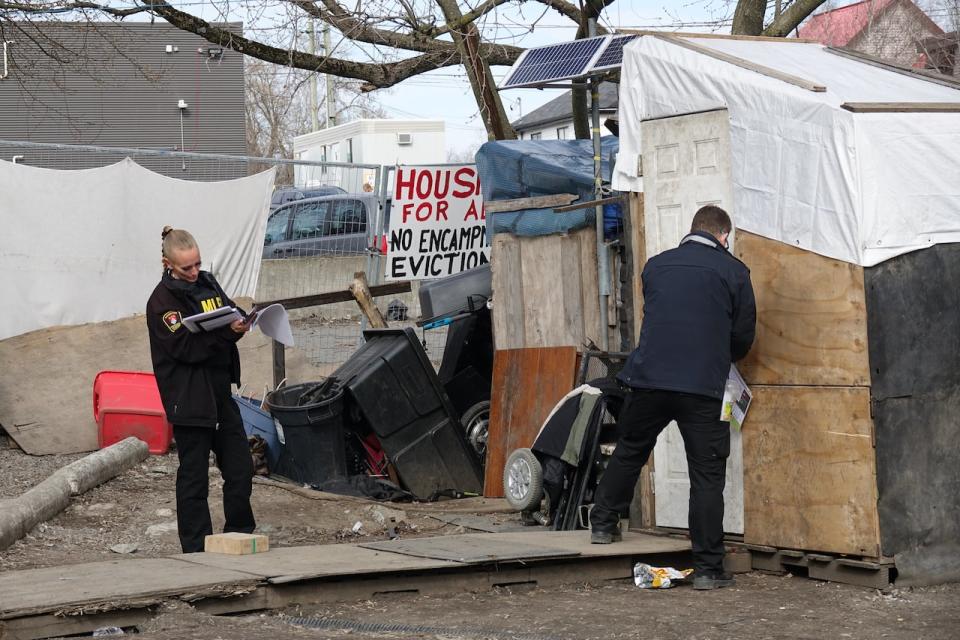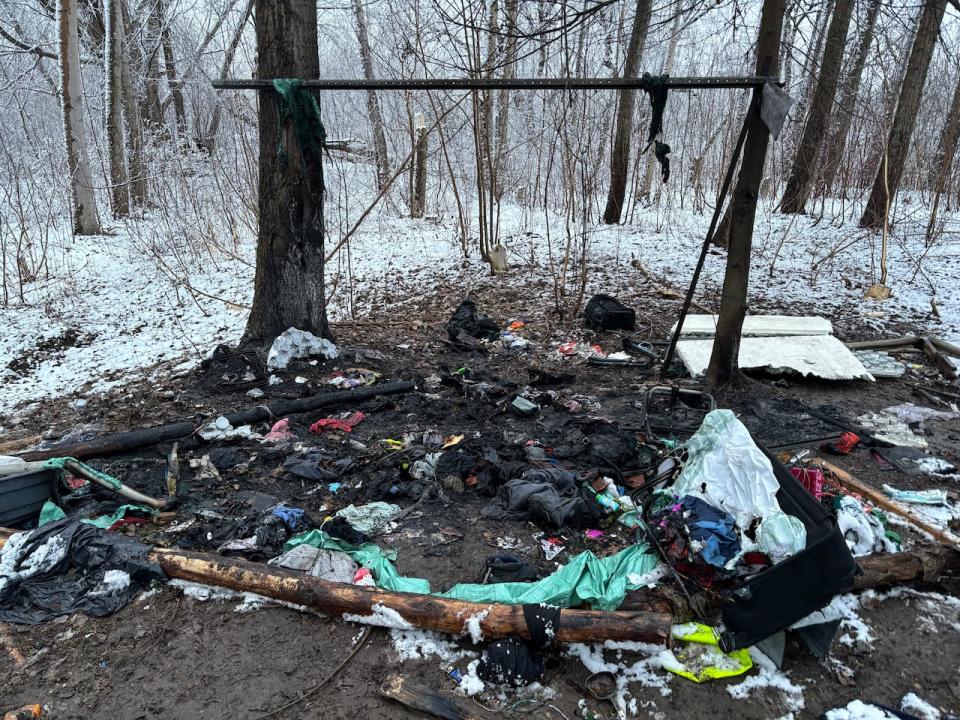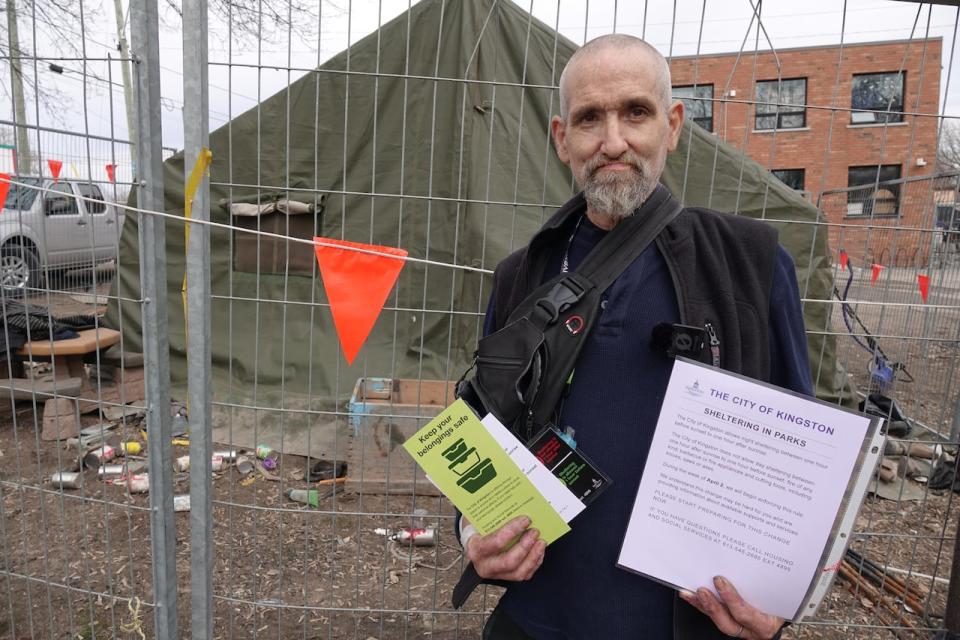'Frustrated, scared, uncertain': Encampment residents worry as Kingston enforces daytime camping ban

Lacey McNeil bristles at the idea that she and others sheltering in Kingston's Belle Park are camping.
"We're not campers," she said. "We're surviving, and barely at that."
McNeil and dozens of others who have been living in tents and other makeshift shelters are preparing to be displaced during the day, after officials announced the eastern Ontario city will begin enforcing a ban on daytime camping at municipal parks this week.
"They're just going to make our already hard time even harder," McNeil said.
Notices posted on tents Tuesday morning warned inhabitants that starting Wednesday, such temporary shelters must be erected no earlier than one hour before sunset and dismantled no later than one hour after sunrise.
According to the notice, Kingston Police have been given the authority to act on the city's behalf if people don't comply.
"No further warning will be given," it reads. The notice includes a phone number for the city's housing and social services to answer any questions about storage, transportation and daytime services.
"We know that this may be difficult for you," the notice states, adding mental health supports will be available on site.
McNeil said she's lived in Belle Park for more than two years and has a job as a harm reduction worker at the Integrated Care Hub (ICH) nearby.
The ICH houses Kingston's only supervised injection site, a service many encampment residents rely on and say isn't available at other shelter options in the city.
Uncertain lives 'that much more uncertain'
McNeil said the city's approach amounts to "displacing displaced people," adding many won't be able to easily strike their shelters each morning only to set them up again hours later.
"We're going to end up losing what very little we've got left," she said. "[I'm] frustrated, scared, uncertain ... scared more than anything. Our uncertain lives are just that much more uncertain."
Kingston announced its plans to begin enforcing the ban in mid-March. Brad Joyce, the city's commissioner of emergency services, said the approach isn't an eviction.
"It's simply, you're packing your tent up for the day," he said at the time.

Kingston bylaw officers hand out information packets letting encampment residents know the city intends to enforce a daytime ban on camping in city parks starting Wednesday. (Dan Taekema/CBC)
Joyce stressed that the city's goal is to encourage people to abide by the parks use bylaw. Transportation, storage and three-person tents that will be easier to set up and take down will also be made available, he told reporters.
Outreach workers, bylaw officers and community partners will be on hand to assist, Joyce added, describing enforcement of trespass laws a "very last resort."
"We really hope never to get there," Joyce said on March 14.
An update from the city's housing and social services team, issued that same day, said an average of 15-20 adult overnight shelter beds have been available in recent weeks.
"For those who choose to access shelters, there is enough space to accommodate people currently sheltering in Belle Park," it read.
Volunteers who work with encampment residents say those numbers fail to recognize how many are really living at the site, including dozens who sleep around a campfire next to the ICH or "tent surf" with acquaintances when the weather turns cold.
Fire department has safety concerns
McNeil said staying warm has proven difficult this spring because of visits from Kingston's fire department, which she said have forced people to hide their heating sources, resulting potentially dangerous situations.
Officials have sounded the alarm about safety at the encampment, repeatedly issuing immediate threat to life notices over the past few months amid a rash of fires.

Kingston Fire & Rescue shared this photo of the aftermath of a tent fire at Belle Park on March 19. No injuries were reported. (Kingston Fire & Rescue)
A media release issued by the city on March 21 quoted chief fire prevention officer Ted Posadowski saying Kingston Fire & Rescue (KFR) responses to the area have risen "700% since 2018."
He added the strain on emergency services over the past two months "has been greater than KFR has ever seen."
"We continue to emphasize that fire prevention is key, and keeping people safe remains our top priority," it read.
Kirk Sabiston, another encampment resident, described the past few weeks as a "roller-coaster of emotions" punctuated by plenty of stress.

Kirk Sabiston stands in front of the sturdy shelter he calls home at Kingston's Belle Park. He holds information from the city about the daytime camping ban. (Dan Taekema/CBC)
He's also lived in the park for more than two years and is currently staying in a large green tent framed with two-by-four and two-by-six boards. A shelter that size won't be easy to take down daily, but Sabiston said he doesn't see any other option.
"It's my house. It's full of everything that I own. It's not like I can just take it down, put it in my pocket and walk away with it," he said.
"I guess I'm going to find a place to hide myself and stand guard on it until they tell me I'm allowed to live my life again."


